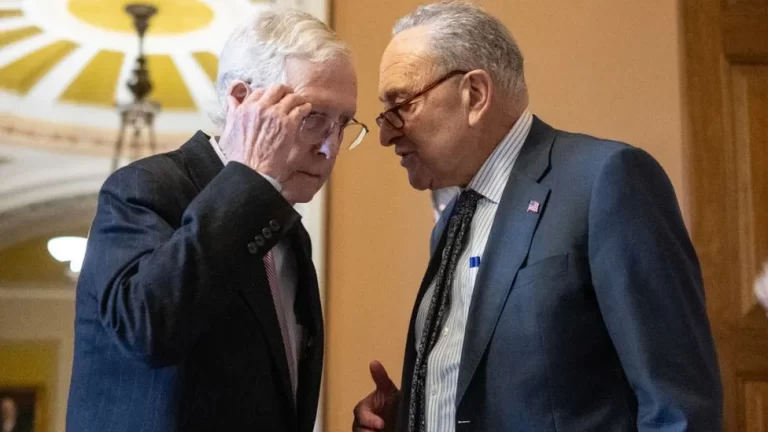Top US lawmakers have reached a tentative deal to avert a partial government shutdown ahead of a Friday deadline to approve funding.
Four funding bills will now be extended to 8 March while the rest of the budget will be extended to March 22.
“We are in agreement that Congress must work in a bipartisan manner to fund our government,” top US lawmakers said in a joint statement. The House is expected to vote on the stopgap measure as early as Thursday.
Democrats and Republicans have been far apart in the budget negotiations on border security and aid to Ukraine.
Republicans control the House by a slim majority, while Democrats hold the Senate by a single seat. Spending bills to keep the US government open require buy-in from both parties in order to advance through both chambers to the president's desk for signature.
There have been 10 US government shutdowns or partial shutdowns over the past four decades.
The bipartisan deal was struck by House and Senate negotiators on Wednesday, one day after congressional lawmakers travelled to the White House to meet President Joe Biden.
It will be “voted on by the House and Senate this week,” according to a statement released by House Speaker Mike Johnson, Senate Majority Leader Chuck Schumer, Senate Republican Leader Mitch McConnell and House Democratic Leader Hakeem Jeffries.
The congressional leaders now face the difficult task of convincing rank and file lawmakers to support the deal.
The Speaker faces fierce objections from right-wing lawmakers in his ranks who want spending cuts and insist any further support for Ukraine should be tied to more money for US border security. Those same members booted out the previous Speaker, Kevin McCarthy, in October, after they were angered by a short-term budget deal that Mr McCarthy made with Democrats.
If a deal is not reached, roughly 20% of government departments, including agencies that oversee agriculture, transportation and veterans affairs, will temporarily close by 12:01 (05:01 GMT) on Saturday.
Other federal funding, including defence spending and homeland security and state department budgets, will expire a week later. Past shutdowns have led to furloughs of government workers and the closure of national parks.
— CutC by bbc.com


